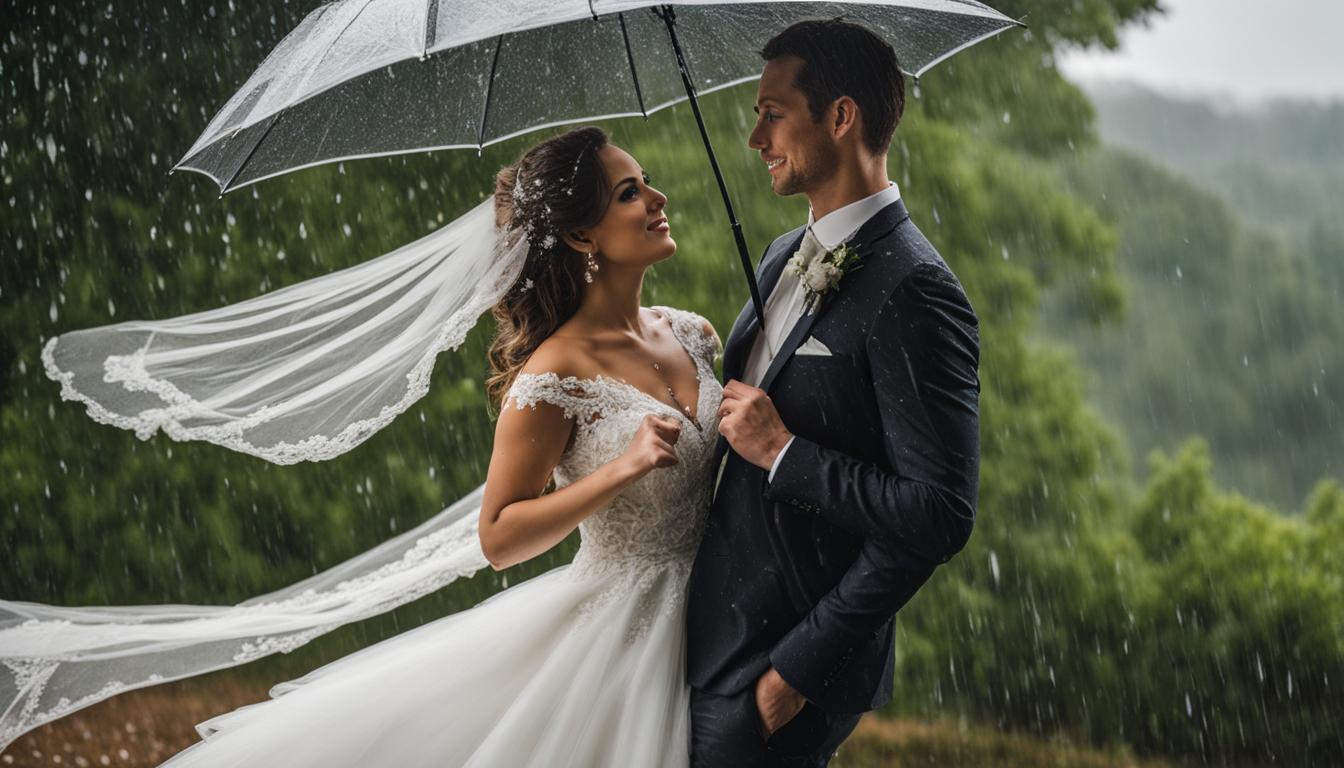Originally posted on November 24, 2023 @ 4:16 am
Have you ever wondered if rain on your wedding day brings good luck or bad fortune? This age-old superstition has sparked debate among couples and cultures around the world. While some believe that rain is a sign of doom, others view it as a symbol of blessings and prosperity. Let’s delve into the origins and interpretations of this wedding day superstition to uncover the truth.
Despite the varied opinions and interpretations, rain on your wedding day is steeped in symbolism and meaning. From fertility blessings to cleansing and unity, rain has long been associated with significant events and emotions. So, let’s take a closer look at the traditions, folklore, and beliefs surrounding rain on your special day.
Key Takeaways:
- Rain on your wedding day is a subject of various traditions and superstitions.
- It can be seen as a symbol of fertility, abundance, and purity.
- Many cultures believe that rain brings good fortune and blessings for starting a family.
- Tears shed on the wedding day are often considered tears of joy and symbolize the release of emotions.
- Understanding the meanings behind wedding traditions and superstitions adds depth to the wedding experience.
The Symbolism of Rain in Wedding Traditions
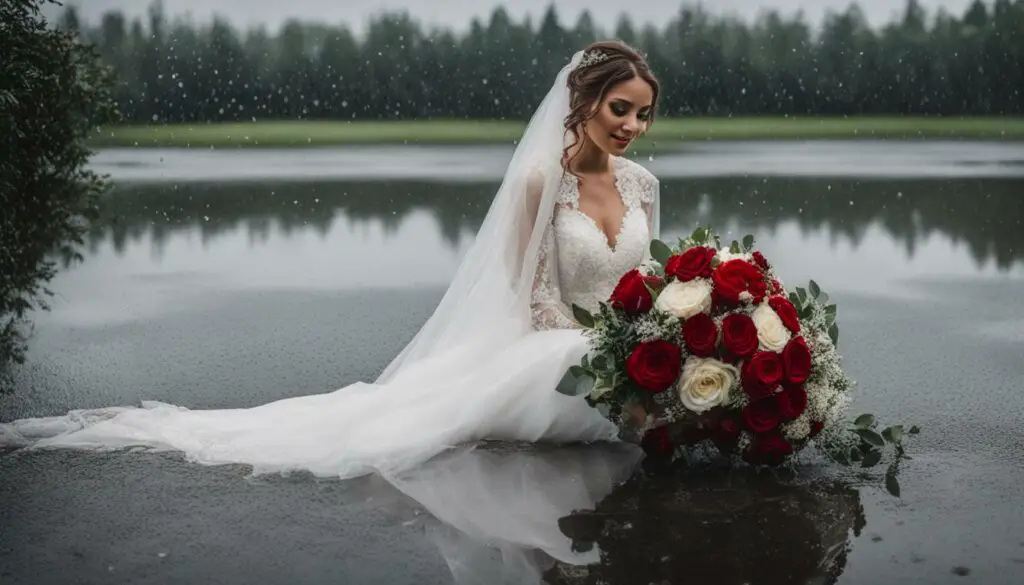
Rain has been symbolically significant throughout history, playing a role in various cultural and religious traditions. In the context of weddings, rain carries symbols of fertility, abundance, renewal, and purity. These interpretations have led to beliefs that rain on a wedding day can be seen as a positive sign, bringing blessings to the couple’s union.
In Aztec culture, rain was associated with prosperity and crop fertility. A downpour on the wedding day was seen as a sign of abundance and the potential for a fruitful marriage. Similarly, in Hinduism, rain is considered a divine gift from the gods, representing abundance and rebirth. Rainfall during a wedding ceremony is seen as a blessing for the couple’s future prosperity and happiness.
“Rain is grace; rain is the sky descending to the earth; without rain, there would be no life.” – John Updike
Furthermore, rain is often linked to purity and cleansing. Just as rain washes away dirt and grime, it is believed to cleanse the couple of any past negativity, allowing them to start their married life with a fresh and pure slate.
Rain on Wedding Day Beliefs Across Cultures
The symbolism of rain on a wedding day extends beyond specific traditions and cultures. Rain has been regarded as a symbol of good luck, blessings, and fertility in various parts of the world. Whether it is the belief in rain bringing fortune and abundance or the association with tears of joy, the idea of rain on a wedding day holds a special place in many cultures.
Here are a few examples of rain-related wedding beliefs from different parts of the world:
| Culture | Belief |
|---|---|
| Irish | Rain on the wedding day is considered good luck and a sign of a prosperous marriage. |
| Italian | It is believed that rain on the wedding day represents a cleansing of bad luck and a fresh start. |
| Chinese | Rain is seen as a symbol of wealth and abundance, bringing good fortune to the couple. |
These beliefs highlight the universal fascination with the symbolism of rain on a wedding day, connecting it to positive outcomes and blessings for the couple.
Ancient Superstitions Around Rain on Wedding Day
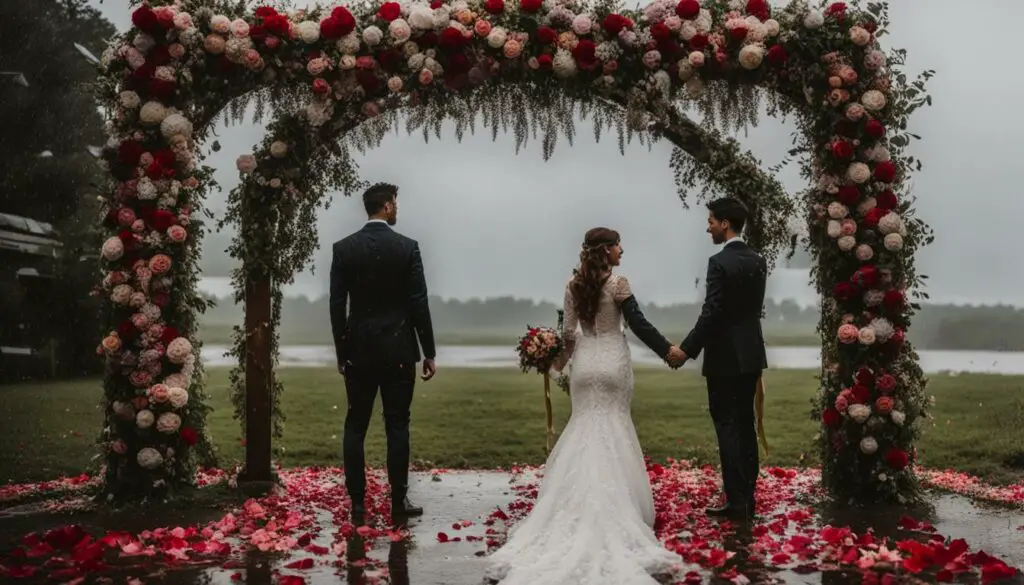
Throughout history, rain on wedding day has been associated with various superstitions and beliefs. Across different cultures, this weather phenomenon is often seen as a positive sign, symbolizing blessings and good fortune for the couple’s future. Let’s delve into some ancient traditions and superstitions surrounding rain on wedding day.
Ancient Cultures and Rain Symbolism
Ancient civilizations considered rain to be a powerful symbol of fertility, abundance, and cleansing. In many cultures, rain was seen as a divine gift that brought prosperity to crops and ensured a bountiful harvest. This association between rain and fertility translated to weddings, where rain was believed to signify the couple’s future fertility and the beginning of a family.
Additionally, rain was viewed as a cleansing force, washing away any negative energy or obstacles that could hinder the couple’s marital bliss. Tears shed by the bride or groom on their wedding day were considered tears of joy, symbolizing the release of any built-up emotions and paving the way for a happy and tear-free marriage.
Positive Portents of Rain on Wedding Day
In many ancient superstitions, rain on wedding day was seen as a positive omen for the couple. It was believed that rain brought good fortune, abundance, and prosperity to the newlyweds. Some cultures even believed that rain on wedding day would bless the couple with a strong and unbreakable marriage bond, symbolized by the wet binding material used in rituals like the handfasting ceremony.
These ancient superstitions highlight the optimistic and hopeful interpretations surrounding rain on wedding day. They convey the idea that rain is a symbol of blessings, purity, and the beginning of a joyous journey together as a married couple.
As we explore the rich history and cultural symbolism associated with rain on wedding day, it becomes clear that this weather phenomenon carries more positive connotations than negative ones. Whether seen as a symbol of fertility, abundance, or as a cleansing force, rain on wedding day has been embraced by many cultures as a sign of good fortune and blessings for the couple’s future.
Handfasting Ceremony and Rain on Wedding Day
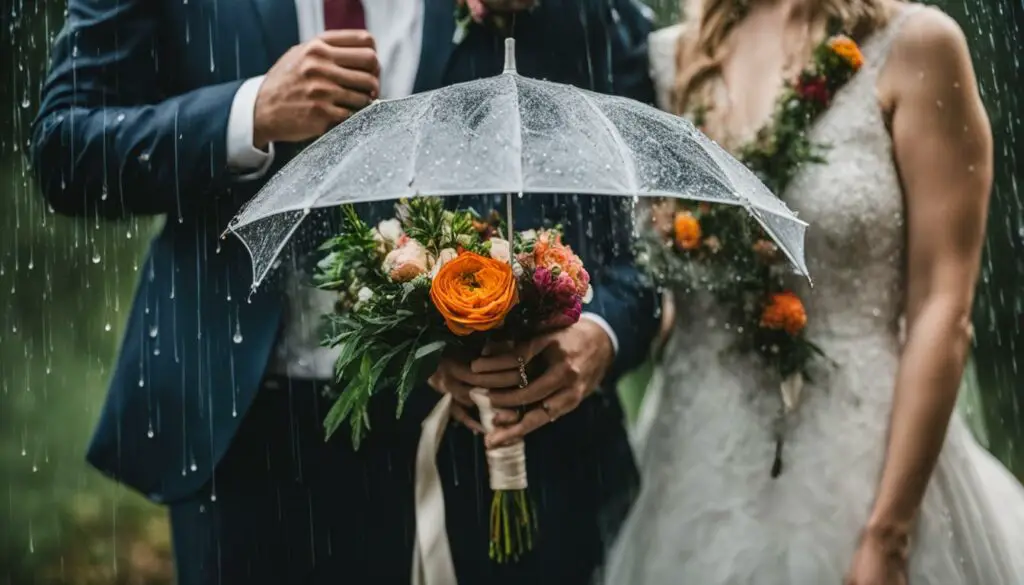
Handfasting ceremonies, dating back to ancient times, involve binding the couple’s hands together with a cord or ribbon. This symbolic act represents the joining of their lives and the creation of a strong and lasting bond. While handfasting ceremonies are meaningful on their own, the presence of rain during this ritual adds an extra layer of symbolism and significance.
According to tradition, if rain falls during a handfasting ceremony, it is believed that the couple’s marriage bond will be stronger and harder to break. The wet binding material represents a stronger knot, symbolizing a resilient and unbreakable union. This belief reflects the idea that challenges and obstacles, such as rain, can strengthen a relationship and prepare the couple for a lifetime of commitment.
The Symbolism of Rain in Handfasting
The symbolism of rain in handfasting ceremonies goes beyond the physical act of wetting the binding material. Rain has long been associated with cleansing, renewal, and fertility. Just as rain cleanses the earth and nourishes new life, it is believed to cleanse the couple’s pasts and prepare them for a fresh start as they embark on their journey together as a married couple.
Furthermore, rain is often seen as a symbol of fertility and abundance. The presence of rain during a handfasting ceremony is believed to bless the couple with fertility and the ability to create a strong and prosperous family. It signifies the couple’s readiness and willingness to embrace the responsibilities of parenthood and nurture a loving and supportive home.
Other Wedding Traditions and Superstitions
Weddings are often filled with traditions and superstitions that add special meaning to the day. While rain on the wedding day is one superstition that has garnered attention, there are many other customs that couples incorporate into their ceremonies and celebrations. These traditions can range from wearing “something old, something new, something borrowed, something blue” to avoiding seeing the bride before the ceremony. Let’s explore some of these wedding customs and their meanings.
Table: Wedding Superstitions and Customs
| Superstition/Custom | Meaning |
|---|---|
| “Something old, something new, something borrowed, something blue” | This tradition originated from an old English rhyme and is believed to bring good luck and fertility to the couple. Each item has a specific meaning: something old represents continuity, something new symbolizes optimism for the future, something borrowed signifies borrowed happiness from a happily married couple, and something blue represents purity, love, and fidelity. |
| Avoiding seeing the bride before the ceremony | This tradition dates back to the time of arranged marriages when the couple was not allowed to see each other before the wedding to avoid any second thoughts or doubts. It adds an element of surprise and anticipation to the ceremony. |
| Breaking glass | Breaking a glass at the end of the ceremony is a Jewish tradition that serves as a reminder of the destruction of the Temple in Jerusalem. It also symbolizes the breaking of old ties and the beginning of a new life together. |
These wedding traditions and superstitions hold special significance for couples and their families. They provide a sense of connection to the past, add meaning to the present, and shape the future of their marriage. By incorporating these customs into their wedding day, couples create a unique and memorable experience that reflects their beliefs and values.
Planning for Rain on Your Wedding Day
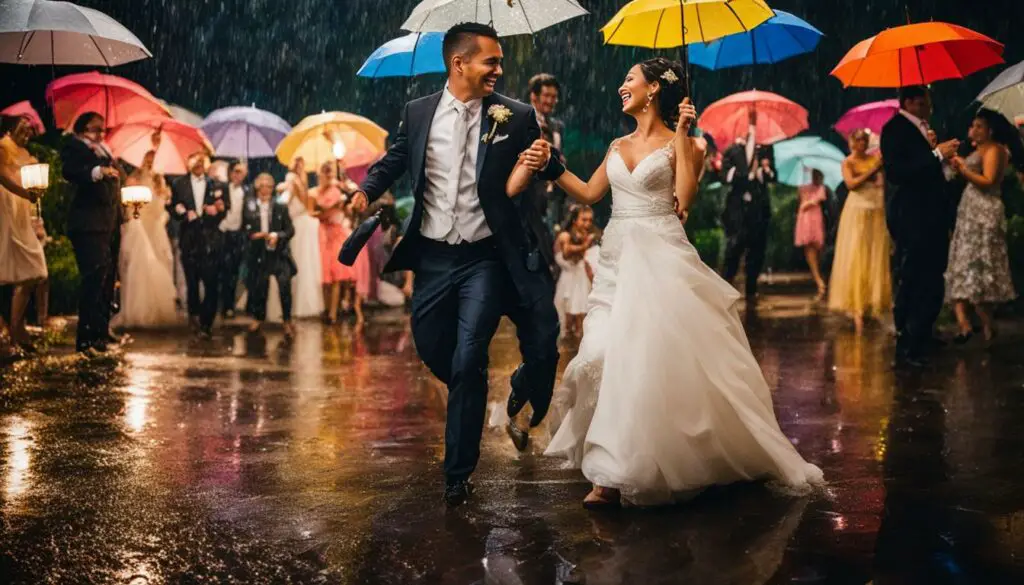
While rain on your wedding day can bring a touch of luck and symbolism, it’s important to be prepared and have a backup plan in place. Here are some tips to help you plan for a rainy day wedding:
Pick a Reliable Indoor Venue
To avoid any last-minute changes due to the weather, consider selecting a wedding venue that offers both indoor and outdoor options. This way, you can easily move your ceremony or reception indoors if it starts to rain. Make sure to visit the venue and assess their indoor spaces to ensure they can accommodate your guest count and desired setup.
Have a Backup Plan
Even if you have chosen an indoor venue, it’s always a good idea to have a backup plan in case of unexpected rain. Work with your wedding planner or coordinator to create a contingency plan that outlines the steps to be taken if the weather does not cooperate. This plan may include setting up tents or marquees, rearranging furniture, or adjusting the timeline to allow for indoor activities.
Embrace the Rain and Get Creative
Instead of letting rain dampen your spirits, embrace the possibility of rain and have fun with it. Consider incorporating rainy day wedding photos or decor into your theme. Think colorful umbrellas, rain boots, or even a playful rain dance. You can also work with your photographer to capture unique and romantic shots in the rain, creating beautiful memories that will stand out from traditional wedding photos.
Remember, your wedding day is about celebrating your love and commitment, regardless of the weather. With proper planning and a positive attitude, you can navigate through any rain showers and create a memorable and joyful wedding experience for you and your guests.
Exploring Common Wedding Superstitions
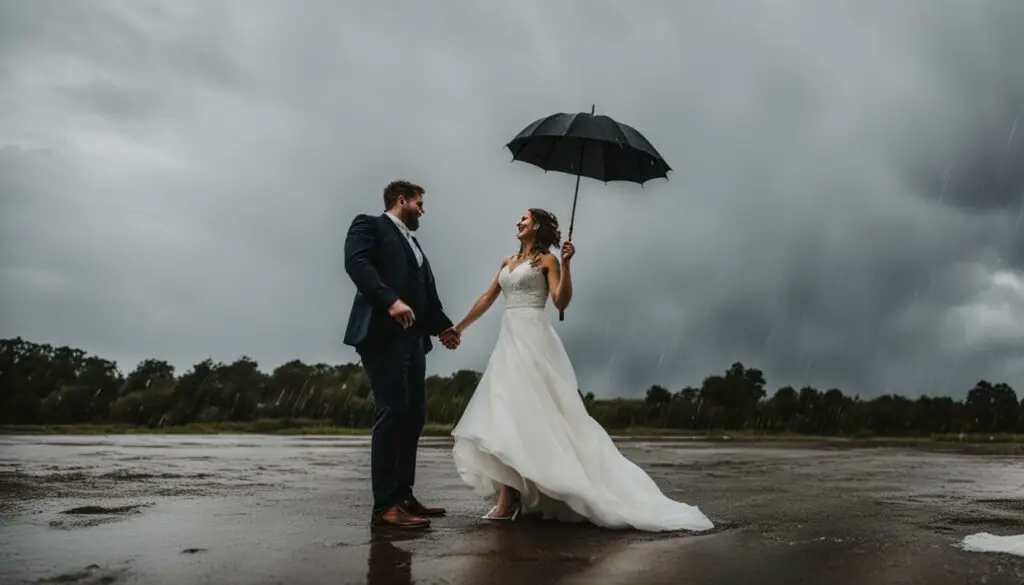
Weddings are steeped in age-old traditions and superstitions that add charm and depth to the celebrations. From carrying something old, new, borrowed, and blue to avoiding seeing the bride before the ceremony, these customs have deep cultural and historical significance. Let’s dive into some common wedding superstitions and explore the reasons behind these cherished traditions.
The Significance of “Something Old, Something New, Something Borrowed, Something Blue”
“Something old, something new, something borrowed, something blue.”
This famous rhyme is often recited to brides as a reminder to incorporate certain items into their wedding ensemble. Each element carries its own symbolic meaning:
- Something old represents continuity with the past, honoring family traditions and heritage.
- Something new signifies optimism and hope for the future as the couple embarks on their new journey together.
- Something borrowed symbolizes borrowed happiness from a happily married friend or family member, implying the importance of support and love.
- Something blue represents purity, fidelity, and love.
The Belief in Rain on Wedding Day Equating to Good Luck
Rain on wedding day often causes concern for couples and their families who fear it may bring bad luck. However, this superstition has a positive twist in many cultures. Rain is believed to symbolize fertility, cleansing, and unity. It is seen as a sign of abundance and blessings, bringing good fortune to the couple as they embark on their journey together. Tears shed on the wedding day are also thought to represent the final shedding of tears before a joyful and tear-free marriage.
The Tradition of the Bridal Veil and the Groom Not Seeing the Bride Before the Wedding
The tradition of the bridal veil dates back to ancient times and serves multiple purposes. In arranged marriages, veils were worn to conceal the bride’s appearance until the ceremony, ensuring that the groom would not back out. This tradition has carried over to modern weddings, adding an element of surprise and anticipation to the moment when the groom unveils his bride. Additionally, the superstition of not seeing each other before the wedding is believed to protect the couple from bad luck and evil spirits. It is also said to heighten the excitement and emotions when they finally lay eyes on each other at the altar.
| Superstition | Explanation |
|---|---|
| Ringing of church bells | This tradition is believed to ward off evil spirits and bless the newlyweds with good luck. |
| Breaking of the glass | Breaking a glass or vase is thought to scare away evil spirits and ensure a harmonious life together. |
| Carrying the bride over the threshold | Traditionally, the groom carries the bride over the threshold to protect her from evil spirits lurking on the floor. |
Wedding superstitions are a delightful part of the ceremony and reception, embodying the rich history and cultural traditions surrounding marriages. Understanding the reasons behind these customs adds depth and meaning to the wedding day, creating lasting memories for the couple and their loved ones.
The History of Veils and Seeing the Bride Before the Wedding
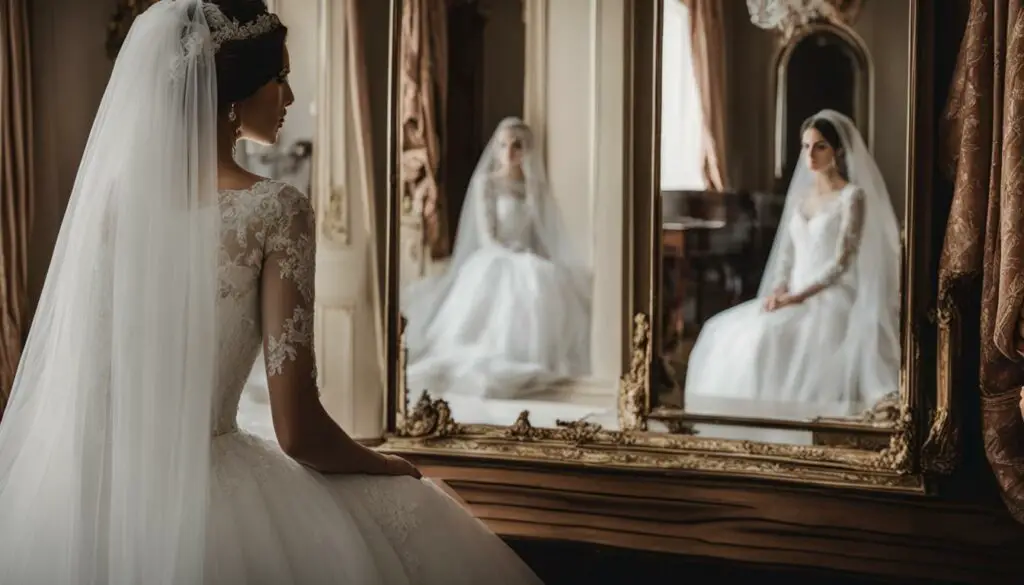
The tradition of not seeing the bride before the wedding and the use of veils dates back to ancient times. In arranged marriages, veils were worn to hide the bride’s appearance until the ceremony, ensuring the groom wouldn’t back out. This tradition has carried over into modern weddings, adding anticipation and excitement to the big reveal.
Veils have long been associated with notions of purity, modesty, and femininity. In ancient Rome, brides wore red veils to protect themselves from evil spirits. In medieval times, the veil symbolized the bride’s virginity and innocence. Today, veils are often seen as a decorative accessory that enhances the bride’s beauty and adds an ethereal touch to her attire.
“The veil adds a sense of mystery and anticipation to the wedding day. It creates a dramatic effect when lifted, symbolizing the bride’s transformation into a wife.”
While some couples choose to adhere to this tradition for its historical and cultural significance, others opt for a more modern approach and decide to see each other before the ceremony. This allows for intimate moments, heartfelt exchanges, and relaxed photo sessions before the whirlwind of the wedding day begins. Ultimately, the decision to follow or break this tradition is a personal one, reflecting the couple’s values and desires for their special day.
The Significance of Bridal Veils
Beyond the tradition of not seeing the bride before the wedding, bridal veils hold cultural and symbolic meanings. Here are a few:
- Symbol of Mystery and Anticipation: The veil adds a sense of intrigue and excitement, heightening the anticipation for the moment when the groom lifts it to reveal his bride.
- Representation of Modesty: Veils have historically been associated with modesty, symbolizing the bride’s purity and virtue.
- Blessing of Good Luck: In some cultures, it is believed that the veil protects the bride from evil spirits and brings good luck to her marriage.
| Historical Origins of Veils | Symbolic Meanings |
|---|---|
| Ancient Rome | Protection from evil spirits |
| Medieval Times | Representation of the bride’s virginity and innocence |
| Modern Weddings | Enhancement of beauty and ethereal touch |
Rainy Day Wedding and Fertility Beliefs
In various cultures, rain on wedding day is believed to signify fertility and the start of a family. The association between rain and fertility can be traced back to ancient beliefs and mythologies, where rain was seen as a divine gift that promoted crop growth and prosperity. The rainfall on the wedding day is regarded as a blessing for the couple’s future fertility and abundance.
Throughout history, rain has been symbolically linked to fertility and renewal. In many cultures, rain represents the life-giving force that nourishes the earth and brings forth new life. This connection between rain and fertility is reflected in wedding traditions, where rainfall is seen as an auspicious sign for the couple’s ability to conceive and start a family.
“Rain on the wedding day is believed to wash away any obstacles or hardships in the couple’s path, paving the way for a fruitful and harmonious union.”
Moreover, rain is often associated with cleansing and purity. Just as rain washes away impurities from the earth, it is believed to cleanse and purify the couple’s relationship, allowing them to enter into marriage with a fresh start and a clean slate. This notion of purification through rain further reinforces the belief in rain on wedding day as a symbol of fertility and the beginning of a family.
The Emotional Significance of Tears on Your Wedding Day
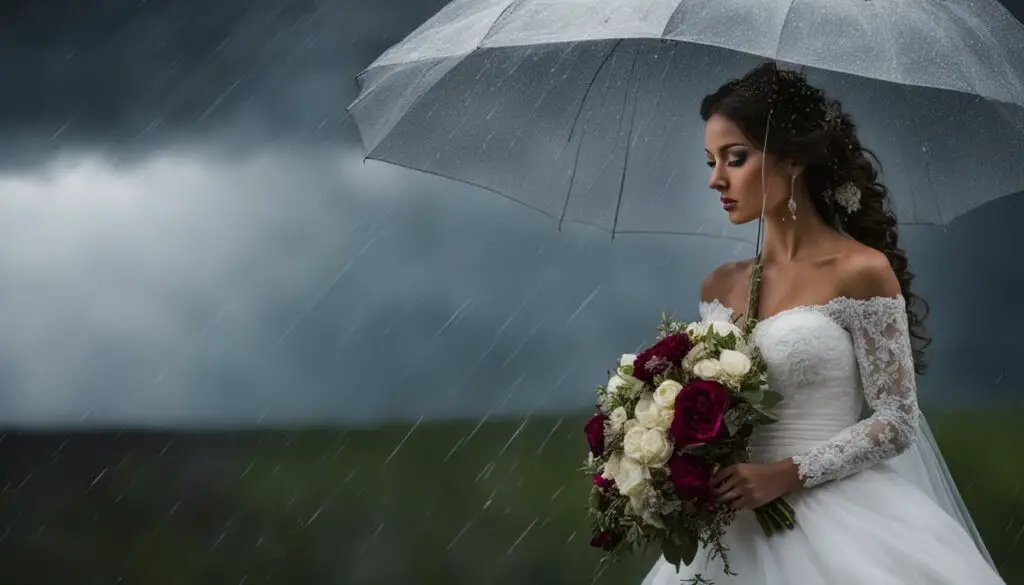
Tears shed on the wedding day carry deep emotional significance. Often referred to as tears of joy, these tears symbolize the release of built-up emotions and the overwhelming happiness felt by the couple. It is believed that these tears represent the final shedding of tears before embarking on a new chapter of life together.
Throughout history, tears have been associated with purification and renewal. In the context of a wedding, tears are seen as an expression of deep emotions and a symbol of the couple’s love and commitment. They are thought to bring blessings to the union and are often seen as a positive and meaningful aspect of the wedding day.
“Tears are words that need to be written.” – Paulo Coelho
Embracing tears on the wedding day allows couples to fully experience and express their emotions. It serves as a reminder that love can evoke intense feelings that are worth cherishing. These tears can also create touching and memorable moments that add depth and authenticity to the wedding celebration.
The Symbolic Power of Tears
The symbolic power of tears extends beyond the wedding day. Tears have long been associated with healing, transformation, and the ability to cleanse the soul. They represent vulnerability, honesty, and the willingness to let go of negative emotions. By shedding tears on their wedding day, couples embrace their vulnerability and open themselves to a deeper connection with their partner.
Ultimately, the significance of tears on the wedding day is deeply personal and subjective. Each couple may interpret and experience tears in their unique way. Whether they are tears of joy, gratitude, or excitement, they serve as a powerful reminder of the love and emotions shared on this special day.
Exploring Additional Wedding Superstitions
Wedding traditions and superstitions have long fascinated couples and added a touch of magic to their special day. Beyond the well-known beliefs surrounding rain on wedding day and the significance of tears shed, there are numerous other customs and superstitions that have been passed down through generations. Let’s dive into some of these intriguing wedding traditions and uncover their deeper meanings.
Something Old, Something New, Something Borrowed, Something Blue
One of the most well-known wedding superstitions is the tradition of incorporating “something old, something new, something borrowed, something blue” into the bridal ensemble. This age-old practice is believed to bring good luck and represent different aspects of a successful marriage.
The something old represents continuity and a connection to the bride’s past, often passed down as a family heirloom. Something new symbolizes hope and optimism for the future. Something borrowed is meant to be an item borrowed from a happily married friend or family member, signifying the transfer of their good luck and marriage bliss to the newlyweds. Something blue is associated with purity and fidelity, linking back to ancient traditions where the color blue was believed to ward off evil spirits.
Spider on the Wedding Dress
While the idea of a spider on a wedding dress may sound alarming, in some cultures, it is actually seen as a good omen. It is believed that if a spider is found crawling on the dress or veil, it signifies good luck, prosperity, and fertility. This tradition can be traced back to ancient Greek and Roman cultures, where spiders were associated with wealth and positive outcomes. So, if you happen to come across a spider on your wedding day, embrace it as a symbol of good fortune!
Avoiding the Gift of Knives
In many cultures, receiving knives as wedding gifts is considered bad luck. The superstition behind this belief stems from the association between knives and cutting ties. Knives are seen as symbolically severing relationships, which is why they are avoided as wedding gifts. Instead, couples are advised to give a penny or a small amount of money in exchange for the knife, thereby turning it into a symbolic purchase rather than a gift.
Wedding customs and superstitions add depth and meaning to the joyous occasion. From the significance of “something old, something new, something borrowed, something blue” to the fascinating beliefs surrounding spiders and knives, these traditions connect us to our past and allow us to celebrate our journey into the future with hope and good fortune.
Conclusion
Wedding superstitions and traditions have long been part of our cultural heritage, steeped in rich symbolism and beliefs. The idea of rain on your wedding day as a sign of luck is just one of many fascinating customs couples encounter. While some may choose to embrace these beliefs, others may view them as mere superstition. Ultimately, the interpretation and significance of these traditions lie in the hands of the couple themselves.
Whether rain brings fertility blessings, tears symbolize joy and release, or rain on your wedding day is considered lucky, these traditions add a unique touch to the celebration. They create special memories and give depth and meaning to the wedding experience. From the handfasting ceremony to the history of veils and seeing the bride before the wedding, each tradition we explore reveals unique insights into our collective past.
As couples plan their big day, these traditions provide an opportunity to connect with their heritage and create a sense of wonder and magic. Whether they choose to honor the customs or simply enjoy learning about them, understanding the origins and meanings behind these beliefs can add an extra layer of joy and significance to their wedding celebration.
FAQ
Is rain on your wedding day considered good luck?
While some believe rain on their wedding day is a bad omen, others see it as a symbol of fertility, cleansing, and unity. The interpretation of rain on wedding day varies across different cultures and beliefs.
What does rain symbolize in wedding traditions?
Rain has symbolized fertility, abundance, renewal, and purity in various cultures throughout history. It is often associated with blessings for starting a family, as well as cleansing and purity.
Are there specific traditions associated with rain on wedding day?
In handfasting ceremonies, rain falling during the ritual is believed to strengthen the couple’s marriage bond. The wet binding material represents a stronger knot, symbolizing a resilient union.
What are some other wedding traditions and superstitions?
Wedding traditions and superstitions go beyond rain on wedding day. Some examples include wearing “something old, something new, something borrowed, something blue,” avoiding seeing the bride before the ceremony, and breaking glass for good luck.
How can I plan for rain on my wedding day?
It’s important to select a reliable indoor wedding venue and have a backup plan in place. Starting the planning process early can help alleviate stress. Embrace the possibility of rain and have creative ideas for rainy day wedding photos or decor.
What is the significance of veils and not seeing the bride before the wedding?
Veils and the tradition of not seeing the bride before the wedding date back to ancient times. Veils were worn to hide the bride’s appearance until the ceremony, and the tradition continues to add anticipation and excitement to the big reveal.
Does rain on wedding day symbolize fertility and starting a family?
In various cultures, rain on wedding day is believed to signify fertility and the start of a family. Rain has been associated with divine blessings for crop growth and prosperity, which is extended to the couple’s future fertility and abundance.
What is the emotional significance of tears shed on the wedding day?
Tears shed on the wedding day are often considered tears of joy and symbolize the release of built-up emotions. Some believe they represent the couple’s final shedding of tears, making way for a happy and tear-free marriage.
Are there any other wedding superstitions and customs to explore?
Yes, there are numerous wedding superstitions and customs, such as having a spider on the wedding dress as a good omen and the symbolism of “something old, something new, something borrowed, something blue.” These traditions add fun and symbolism to the wedding experience.
What is the history and cultural significance behind wedding superstitions?
Wedding superstitions have historical and cultural roots, with many traditions dating back to ancient times. Understanding their meanings adds depth and meaning to the wedding experience.
Is rain on your wedding day considered lucky?
The belief in rain on wedding day as lucky or unlucky varies. While some see it as a positive symbol of fertility and blessings, others may interpret it differently. Ultimately, it is up to the couple to interpret and embrace these beliefs.
